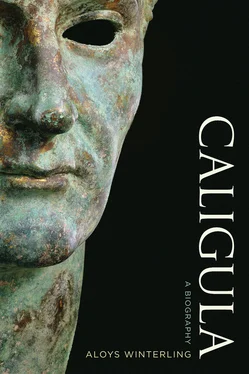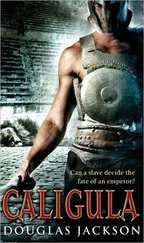The stay in Rome lasted only a few months. Already in the fall of the same year Germanicus was given the task of reorganizing governmental affairs in the eastern part of the Empire. Again his wife, Agrippina, accompanied him, and so did Caligula, while the other children remained behind in Rome. The trip turned out to be a combination of educational journey and ruler’s progress. In addition to his military skills Germanicus is reported to have been very knowledgeable about Greek and Roman traditions and well versed in literature; he is thought to have written comic plays in Greek himself. The group visited the site of the naval battle at Actium, where Augustus (then still known as Octavian) had defeated Marcus Antonius, Germanicus’s grandfather. The next stop was Athens, followed by the islands of Euboea and then Lesbos, where Agrippina gave birth to another child, Livilla. They then traveled through northwestern Asia Minor to Byzantium and the Black Sea before returning to the Aegean coast. After making an excursion to Troy the family headed for Syria next, making intermediate stops that included Rhodes. Everywhere the potential successor to the throne, his wife, and their small son were received with great honor. As we know from surviving inscriptions and coins, several cities used the opportunity to commemorate Germanicus and Agrippina as deities, a form of honoring rulers that had a long tradition in the Greek East. Twenty years later the town of Assos on the coast of Asia Minor reminded Caligula, then emperor, that he had first set foot on the soil of the province of Asia there in the company of his father.
From Syria the group proceeded to a further country under Roman influence: Armenia, where a new king was crowned. After seeing to the reorganization of some parts of the Roman administration, particularly in Cappadocia and Commagene, Germanicus proceeded with his family to the famous ancient city of Alexandria. It was here that the Ptolemaic kings had resided in their magnificent palaces, but also where Caesar and Antonius had lived with Queen Cleopatra. The inhabitants of the city, which had served as an opposite pole to Rome during the civil war, staged great festivities to celebrate Germanicus’s arrival. After an excursion up the Nile to see Memphis and the Pyramids, the family returned to Syria.
There the journey came to a sudden and tragic end. Germanicus fell ill and died on 10 October of the year 19, at the age of thirty-three. An open quarrel had broken out with Gnaeus Calpurnius Piso, the governor of Syria, and as he lay dying Germanicus accused the governor of poisoning him. A rumor to this effect quickly spread and soon acquired the added detail that the actual instigator had been the emperor Tiberius himself. It was said he had plotted the murder of his adopted son because Germanicus’s great popularity with the common people and soldiers had turned him into a rival.
On his father’s death Caligula, then a boy of seven, was thrust into the spotlight for the last time during his childhood. He was once again at the center of extraordinary events, but now of a sad kind. When Agrippina, accompanied by Caligula and Livilla, arrived in Brindisi with the urn containing her husband’s ashes, she was met by a huge crowd of mourners. Two cohorts of the Praetorian Guard provided an escort for the family’s onward journey. Drusus, the son of Tiberius, and Claudius, Germanicus’s brother, came as far as the town of Tarracina to meet them, accompanied by the four other children, the consuls, the Senate, and citizens from the city. They escorted the procession back to Rome, where Germanicus’s remains were interred in the Mausoleum of Augustus. Vast crowds of Romans lined the streets for his funeral.
For Caligula, his father’s death was a major turning point in his life in more respects than one, for it affected not only his family. He had spent his first seven years in an elevated position in a milieu dominated entirely by monarchic institutions. The role played by a Roman general in war was monarchical, and the position of a Roman governor in the provinces resembled that of a monarch. At the legionaries’ camp on the Rhine, in the triumph at Rome, and on the journey through the eastern parts of the Empire, Caligula had always been presented to a public that transferred some of its veneration for the outstanding prince Germanicus to his small son. The general popularity that “Little Boots” thus enjoyed became visible again eighteen years later in the enthusiasm with which the population greeted his accession to the throne. In the intervening years, however, Caligula would have very different experiences. The admiration showered on him when he stood beside a future emperor gave way to a long phase marked by peril and mortal enmities. Along with the rest of his family Caligula was exposed to such threats, which cost his mother and brothers their lives.
CONDITIONS IN ANCIENT ROME UNDER TIBERIUS
The reign of Tiberius (14–37) was of central importance not only to young Caligula personally, but also to the development of the emperor’s position, which had implications for Caligula’s own later rule. Difficult as it is to sum up the character and actions of the second Roman emperor, one conclusion is irrefutable: The legacy left him by his stepfather and adoptive father, Augustus, required the emperor to play a complex role, and Tiberius never grew into it. One could say that while Augustus did play the part like a consummate actor, Tiberius took it all at face value. If the former princeps had exercised his power vis-à-vis the aristocracy by pretending that he did not possess it, then the latter had the power but did not exercise it. And if during the rule of Augustus the senators could pretend that they were exercising power that they did not possess, under Tiberius they possessed power that they could not exercise.
The new emperor’s first step had been to make sure he controlled the armed forces; the Praetorian Guard and the legions had to swear an oath of allegiance to him. From time to time he summoned the guard to drill in front of the assembled senators as a visible demonstration of his power. He disapproved, however, of the evident result of this situation, already discernible under Augustus — namely that the members of the aristocracy, whose chances for advancement depended to a great extent on the emperor’s favor, attempted to guess what he wanted and then behaved opportunistically to gratify him. Tiberius acted as if the Republic had been restored in actual fact. He frequently had the Senate debate matters related to the real exercise of power without letting the senators know his own position, but was then highly displeased when they reached decisions counter to his wishes — and he let the senators involved feel his wrath. Thus, Tiberius failed to manage the paradoxical situation of sole rule and Republican institutions, as he might have done had he followed Augustus’s model and resorted to ambiguous communication. Instead, he acted in all sincerity, confronting the senators with contradictory demands: They were to accept him as emperor, but also act as if he did not exist, as if the Senate truly remained the real center of power, as it had been in the time of the Republic.
The difficulties that ensued as the emperor and the Roman aristocracy tried to communicate with one another in the Senate are vividly rendered in Tacitus’s account of the reign of Tiberius in the Annals . To carry out the emperor’s will without knowing what that will was required considerable skill on the part of the senators. In a telling example from the year 15, when the Senate was debating a matter of direct personal concern to him, Tiberius declared that he would vote under oath and called on the other senators to do likewise. Calpurnius Piso responded: “In what order will you register your opinion, Caesar? If first, I shall have something to follow; if last of all, I fear I may inadvertently find myself on the other side” (Tac. Ann . 1.74.5–6). This man known for his courage brought up the problem that usually went unmentioned, in conjunction with a clear indication of his readiness to submit to the emperor’s wishes, but, as Tacitus reports, at the same time he could not avoid embarrassing Tiberius.
Читать дальше




